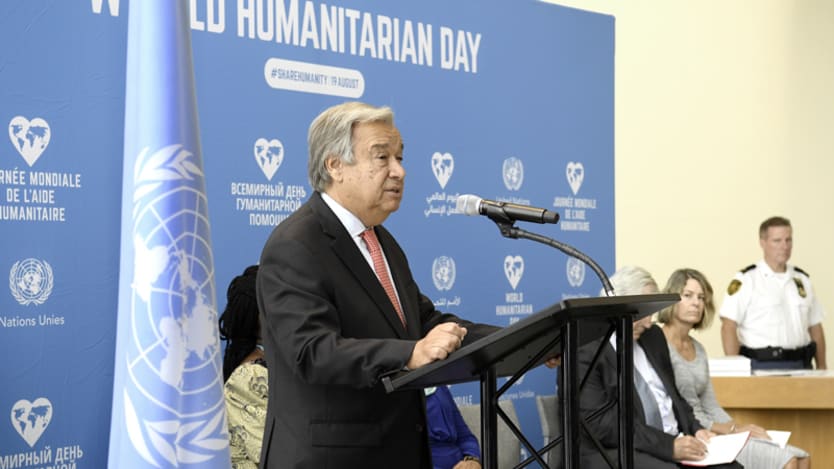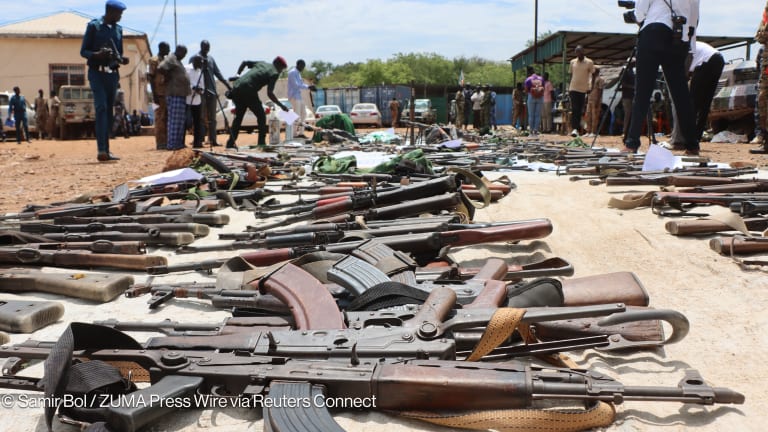
UNITED NATIONS — United Nations Secretary-General António Guterres paid tribute on Friday to fallen U.N. colleagues and humanitarian workers for World Humanitarian Day, while calling for states to uphold international law for civilian protection in conflict zones.
“Every civilian has a right to safety and protection. We must all do everything we can to deliver on this right,” he said on Friday, speaking in the U.N. Headquarters lobby one day before the official commemoration. “We must enhance respect for international humanitarian and human rights law. We must protect humanitarian and medical missions and prioritize the protection of civilians in United Nations peace operations.”
While protection of civilians is a fundamental tenet of international humanitarian law, increasingly, violence against aid workers has become part of the normal landscape in conflict, said Abby Stodard, a member of the independent research organization Humanitarian Outcomes. Her group has found that 54 aid workers died as a result of actions of states in the past two years.
“It is both demoralizing and seemingly futile to invoke protections of international law when the powerful states that are entrusted with enforcing and upholding it are sometimes its violators,” she said. “So one thing I hope we can take away from these events is although this violence is sadly normal, it must never be normalized.”
An unknown number of aid workers were attacked last year — a lack of accuracy that some international health and aid groups attribute to underreporting and fear of retaliation. While estimates vary, the U.N. recognized 158 attacks on aid workers in 2016, according to Under-Secretary-General for Humanitarian Affairs and Relief Coordinator Stephen O’Brien, who spoke alongside Guterres on Friday.
See more related stories:
▶ New app to support disability in emergency response
▶ World Humanitarian Day: Women on the frontline
▶ IKEA and MSF tackle 'underreported' crises with new partnership model
▶ Opinion: There are no more excuses for aid agencies to ignore sexual violence
Among those attacks, 101 aid workers were killed, 98 were wounded and 89 were kidnapped. Those attacks include mass rape of female aid workers in South Sudan, he said. And the majority of those targeted were national staff of humanitarian organizations.
In the past three months, armed attacks forced the International Rescue Committee to temporarily close their offices in the Central African Republic. O’Brien also cited recent attacks in Somalia, South Sudan and Syria and the Democratic Republic of Congo.
On Wednesday, the U.N. Security Council took on the issue of two U.N. experts — an American and a national of Chile and Sweden — who were murdered in the DRC in March by militia. The U.N. absolved itself of responsibility for their deaths, in a report that was criticized by Nikki Haley, U.S. ambassador to the U.N. The two experts, Michael Sharp and Zaida Catalan, were traveling in Kasaï-Central Province without basic tracking devices and on private motorbikes. They had not requested an armed escort, according to the U.N.
The number of attacks on aid workers has increased since the inception of World Humanitarian Day 14 years ago, following the 2003 bombing of the U.N. Headquarters in Baghdad. In that attack, Sergio Vieira de Mello, the U.N. special representative to Iraq, and 21 colleagues were all killed.
But the continued rise of violence since that time has recently reached record levels, concentrated mainly in the world’s largest and protracted conflicts in countries including Afghanistan, Sudan and Somalia.
“What’s remarkable about those figures is that they are unremarkable. The number of attacks and the number of victims that they claimed increased only slightly from the previous year,” Stoddard said. “These men and women are working in war zones and their casualty rate sometimes exceeds those of uniformed peacekeepers and soldiers. They have no force protection, no defense, no deterrent weapons.”
Guterres evoked his personal experiences as the former head of the U.N. Refugee Agency and recalled the “horrifying” experience of seeing “more and more” aid workers lose their lives.
“To see some of my colleagues losing their lives in the line of duty has been one of the most horrible experiences I had in my life.”
Read more international development news online, and subscribe to The Development Newswire to receive the latest from the world’s leading donors and decision-makers — emailed to you free every business day.








